|
|
|
Sort Order |
|
|
|
Items / Page
|
|
|
|
|
|
|
| Srl | Item |
| 1 |
ID:
078528


|
|
|
|
|
| Publication |
2007.
|
| Summary/Abstract |
The recent dramatic increase of North Korean refugees in South Korea (called saeteomin, new settlers) has attracted the attention of scholars as well as practitioners not only because of their impact on South Korea and its citizens but, more significantly, because of their unique experiences there. They have encountered various hardships in South Korean society, including economic difficulties, maladjustment to schools, and emotional distance or isolation. This article attempts to illuminate and analyze the status of the North Korean refugees and their perceptions and emotions with respect to South Koreans.
|
|
|
|
|
|
|
|
|
|
|
|
|
|
|
|
| 2 |
ID:
147372
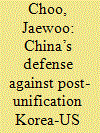

|
|
|
|
|
| Summary/Abstract |
China has long upheld a neutral, if not opposing, stance to Korean unification, a stance which could be largely defined as the political risks associated with the Republic of Korea (ROK)-US alliance and the stationing of US forces (USFK) in South Korea. Given South Korea’s need to engage USFK forces, does it imply there would not be a complete resolution to the Korean conundrum and to the future status of the US-ROK alliance and the USFK forces? In the recent years, the Chinese has somewhat softened its stance and its support of South Korea’s unification initiatives can be seen coming from the party, the military, and the political realm. Empirical evidence and logical inference from recent Chinese intellectual discourse have indicated that China’s security concerns could possibly be allayed if there is a redefinition of the ROK-US alliance and the USFK in the context of defending Taiwan and if the Korean unification precedes China’s.
|
|
|
|
|
|
|
|
|
|
|
|
|
|
|
|
| 3 |
ID:
061025


|
|
|
| 4 |
ID:
142798
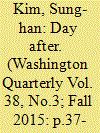

|
|
|
|
|
| Summary/Abstract |
Whenever a North Korean regime “contingency” occurs, it would be the right occasion to seek unification of the Korean peninsula. But some advance peacetime strategy and vision is required to manage the security challenges and divergent priorities of all the major players involved.
|
|
|
|
|
|
|
|
|
|
|
|
|
|
|
|
| 5 |
ID:
103428
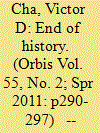

|
|
|
|
|
| Publication |
2011.
|
| Summary/Abstract |
This article argues that prospects for change in North Korea and, thus, reduction in threats to regional security, lay more in rising prospects for Korean unification than in scant hopes for reform inside North Korea. It identifies several factors that have made unification a more salient idea than at any time in the last decade. First, Kim Jong Il's failing health and his youngest son's and designated heir's uncertain grip on succession mean greater risk of political instability in North Korea that could bring discontinuous change, including reunification. Second, it has become clear that the Six Party Talks and other diplomatic efforts will not produce denuclearization and reduction of the regional security threat posed by Pyongyang's weapons program. Third, the current and likely future leadership in Pyongyang is incapable of reform, making regime collapse a more likely scenario and unification a more likely route to meaningful change. Fourth, the North Korean regime has become heavily dependent on Chinese support, material and political-diplomatic. Finally, thinking about how unification might occur has shifted to scenarios that are more feasible to key parties, including South Korea, the United States and Japan.
|
|
|
|
|
|
|
|
|
|
|
|
|
|
|
|
| 6 |
ID:
078147


|
|
|
| 7 |
ID:
096031
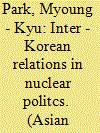

|
|
|
|
|
| Publication |
2010.
|
| Summary/Abstract |
This article aims at explaining the changes in inter-Korean relations since inauguration of the new administration in South Korea in 2008. By focusing on leadership, regime, and social factors in the two Koreas, the article emphasizes the social dynamics that are shaping inter-Korean relations despite the nuclear dispute. In the political realm, a tough stance toward North Korea's nuclear ambition by the South's government has created a sense of frustration within the North Korean leadership, causing tension and conflict with the South. In the social realm, however, both Koreas have been pressured by political and economic hardship and a growing sense of crisis among their citizens. From that latter perspective, however, the prospects are that the two Koreas will move toward more cooperative behavior. The role of nongovernmental organizations (NGOs) and the United States will be important in achieving that outcome.
|
|
|
|
|
|
|
|
|
|
|
|
|
|
|
|
| 8 |
ID:
141490
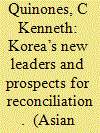

|
|
|
|
|
| Summary/Abstract |
The Republic of Korea and the Democratic People’s Republic of Korea since 1972 have attempted reconciliation, but without durable success. The latter’s building of a nuclear arsenal erased the progress achieved in 1989–1992 and 1998–2008. Assessed here is whether the new leaders of both Koreas since 2012 might be able to resume progress toward reconciliation. Ultimately, Park alone cannot sustain progress toward reconciliation unless she receives substantial domestic political support and North Korean leader Kim Jong-un responds constructively to her effort.
|
|
|
|
|
|
|
|
|
|
|
|
|
|
|
|
| 9 |
ID:
138689
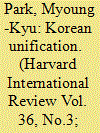

|
|
|
|
|
| Summary/Abstract |
n January 2014, South Korean President Park Geun-hye’s reference to the unification of the two Koreas as a potential “economic bonanza” caused a resurgence of interest in the unification dialogue. Subsequently, in May and June of 2014, President Park brought up the topic of unification as a major agenda item for South Korea, toward which both US President Obama and Chinese President Xi Jingping expressed approval. The North Korean regime, however, evinced a strong negative reaction to these statements, and the official newspaper of the Central Committee of the Worker’s Party of Korea, Rodong Sinmun, made its stance explicit in arguing that the international community’s confrontational maneuvers “injure [the North Korean] ideology and system.” Countries neighboring the Korean peninsula have also tended to accept unification as an elusive vision for the future rather than as an immediate possibility. To what extent, then, are the theories of peaceful unification feasible initiatives, and how can they contribute to peacebuilding in northeast Asia and the international community?
|
|
|
|
|
|
|
|
|
|
|
|
|
|
|
|
| 10 |
ID:
139950


|
|
|
|
|
| Publication |
Seoul, Research Center for Peace and Unification, 1976.
|
| Description |
xx, 23-420p.hbk
|
|
|
|
|
|
|
|
|
|
|
|
Copies: C:1/I:0,R:0,Q:0
Circulation
| Accession# | Call# | Current Location | Status | Policy | Location |
| 017622 | 951.9/KIM 017622 | Main | On Shelf | General | |
|
|
|
|
| 11 |
ID:
061543


|
|
|
| 12 |
ID:
148192


|
|
|
|
|
|
|
|